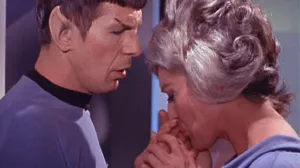The Writers Guild of America strike is officially over! After coming to a tentative deal over the weekend, WGA leadership approved the contract with the Alliance of Motion Picture and Television Producers, bringing the 148-day strike to an end. With that, the new MBA itself has been released, so everyone can see what new terms were agreed to. The WGA made major strides in many key areas, including artificial intelligence and streaming residuals.
Videos by ComicBook.com
When it comes to AI, the new deal establishes that anything written by AI programs isn’t literary material and can’t be considered source material. It also keeps studios from requiring writers to use or work with AI.
As far as streaming goes, there are now residuals in place based on the performance of big titles, as well as premiums for scripts. Streaming services are also required to share viewership data with the WGA.
You can check out the summaries of these issues in more detail below.
AI Protections Explained
Here’s the WGA’s summary of the new artificial intelligence:
- AI can’t write or rewrite literary material, and AI-generated material will not be considered source material under the MBA, meaning that AI-generated material can’t be used to undermine a writer’s credit or separated rights.
- A writer can choose to use AI when performing writing services, if the company consents and provided that the writer follows applicable company policies, but the company can’t require the writer to use AI software (e.g., ChatGPT) when performing writing services.
- The Company must disclose to the writer if any materials given to the writer have been generated by AI or incorporate AI-generated material.
- The WGA reserves the right to assert that exploitation of writers’ material to train AI is prohibited by MBA or other law.
New Terms for High Budget Subscription Video on Demand
Here is the WGA’s summary of the new subscription streaming regulations:
- Increased foreign streaming residuals: Foreign streaming residuals will now be based on the streaming service’s number of foreign subscribers for services available globally, amounting to a 76% increase (including a 2.5% base increase) to the foreign residual for the services with the largest global subscriber bases over 3 years. For instance, Netflix’s 3-year foreign residual will increase from the current $18,684 for a one-hour episode to $32,830.
- Viewership-based streaming bonus: The Guild negotiated a new residual based on viewership. Made-for HBSVOD series and films that are viewed by 20% or more of the service’s domestic subscribers in the first 90 days of release, or in the first 90 days in any subsequent exhibition year, get a bonus equal to 50% of the fixed domestic and foreign residual, with views calculated as hours streamed domestically of the season or film divided by runtime. For instance, projects written under the new MBA on the largest streaming services would receive a bonus of $9,031 for a half-hour episode, $16,415 for a one-hour episode, or $40,500 for a streaming feature over $30 million in budget. This bonus structure will take effect for projects released on or after January 1, 2024.
- Streaming Data Transparency: The Companies agree to provide the Guild, subject to a confidentiality agreement, the total number of hours streamed, both domestically and internationally, of self-produced high budget streaming programs (e.g., a Netflix original series). The Guild may share information with the membership in aggregated form.
- Premium for Pilot & Backup Scripts: 150% pilot premium and 115% backup script premiums will now apply to programs made for HBSVOD.
You can check out the summary of the complete 2023 WGA MBA here.








